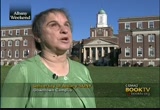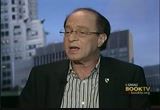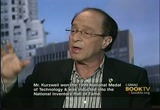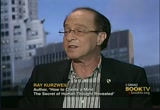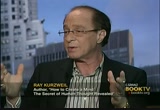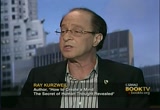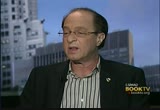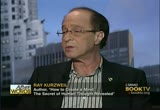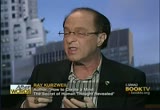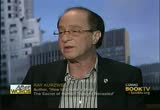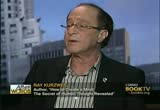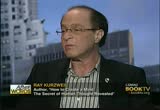tv Book TV After Words CSPAN December 9, 2012 12:00pm-1:00pm EST
12:00 pm
i think all of that is information that generalizes across the country. i also think that again i'll be in every 10 members of congress, but really getting to his cell at perspective on those numbers really just add so much depth to what you know. it's a little corny, but she really appreciate all the different things these numbers do. i think at a time when congress is getting really trashed and bashed and that kind of status that it is really hard and in some ways to avert a book that makes you appreciate all the holistic picture of members of congress and their districts. so how did i research the book? most of it is based on public records sources. i took the perspective on the average constituent so not going
12:01 pm
to have a lot of access to members. so i looked at newspaper articles, internet services, all kinds of public record documents. i interviewed a couple of them, but after a while i decided to stay away from the interview perspective and i really tried to take the view of ion the outsider. if somebody wanted to find out about numbers of congress in the outside and obviously i'm an overly interested outsider so i'm not the typical outsider, but if somebody wanted to find out about members, what would they have to do to do that? there's an amazing amount of public records sources out there. you can find out a lot and enough to get a good picture, get a reasonable picture of what a member of congress is doing.
12:02 pm
>> this week, ray kurzweil and his latest book, "how to create a mind: the secret of human thought revealed." and it would national level of recipients attempts to determine how the brain works and apply knowledge to the creation of intelligent machines. he discusses the research of the editor of scientific american mind and gradebook wrote then. >> host: this is a fascinating book that you've written. >> guest: thank you. >> host: was great to be here with you. my first question is basically
12:03 pm
to talk about the need he says that the book. are you saying that we can basically reverse engineer the human brain, that it's feasible to do that or we can create a computer mind that's indistinguishable from yours and mine likes >> guest: it is feasible. it's a level of perplexity we can have. basically the principles of the neo cortex in the book. some people say and i articulate this criticism in the book and respond how every one of the hundred trillions of connections this reworkings to be. where's that design information? there's only 25 million information in hundreds of kinds of connections. so there's a lot of repetition and design principles.
12:04 pm
in particular, the main thesis is the 300 million gouda recognizers and they're all basically using the same algorithm and is recognizers connect themselves in a hierarchy. the neo cortex can develop these ideas were. that's the essence of it. they basically running the same method in secret of human thought is the ability to build a hierarchy with other recognizers. so at a low level where recognition simple things like the crossfire and a higher level you have thomasa as an apple. it's a much higher level. that was funny, that was ironic. they are the same except for the position in the hierarchy. produce a hierarchy come with? were not with warren --
12:05 pm
[inaudible] we are not born with that knowledge of english or chinese. in fact, all of these connections reflect memories, personality. the neo cortex creates from our own experience. so the more important you are what you think. the grandson has laid down several layers. you basically can work on one-liner at a time. >> host: the layers have been sent to some extent by biology come at a geometric information. >> guest: the ability to create the layers as they are, but a newborn is struggling with understanding very basic sounds in shape and touch and is flying
12:06 pm
down the most basic level of hierarchy. the reason a child can learn material so it easily is because -- [inaudible] it doesn't mean we can't learn new things. anything we've learned is not just have one copy of that. i can get some of that generation. i can give up old memories altogether. we get old patterns and learn new one.
12:07 pm
but this hierarchy re-creates with their own experiences. the process of mourning, which is not just formal school education, but interactions with her parents about the whole world is a very important part of the development of intelligence. you could do a perfect job of re-creating the neo cortex and i wouldn't do anything useful, just like a newborn is limited in scale without an education. in fact, that's an important paradigm for the a.i., artificial intelligence is to them. >> host: can you elaborate on what the neo cortex is as opposed to the blame? >> guest: gets old brain and the neighboring. only mammals have the neo cortex. early mammals emerged over 100 million years ago.
12:08 pm
the neo cortex is the size of a postage stamp. it's as thin as stamp and basically the outer layer, the new ryan of the brain. it's capable of thinking is hierarchical fashion. >> host: that the part of the brain you are focusing on? >> guest: these early mammals was limited, but enabled them to learn no schools -- new skills. but they were able to adapt. that was not so much of an advantage because the environment to change quickly. it took thousands of years for the environment to change. just enough process of changing behavior over thousands of generations was good enough for species until the cretaceous extinction of this cataclysmic event 65 million years ago we see geological evidence of it
12:09 pm
everywhere in the world. something dramatic happened and changed the environment suddenly 65 million years ago. we do not environment change suddenly. surpass inside the species who could not adapt very quickly died out. that's actually when the mammals came to prominence in the ecological lives. so they anthropomorphize biological evolution. so it started growing as mammals evolved. by the time you get to primates, it is no longer just a plain. it now has all these convolutions, basically to extend its surface area. so in any primates it has all these issues. you can still stretch it out and make a cheese about the size of a large table napkin, still thin
12:10 pm
and still be a delay of that now comprises 80% of the brain. it's basically where we do our hierarchical thinking. we still have the old buried to prevent their motivations, fear, sex drive, pleasure, but they're modulated, sublimated by the neo cortex that may take my aggression and turn it into writing a poem. but only primates have an ability to do that at a high conceptual level. i say the major renovation and sapiens as we have this large forehead to allow more neo cortex. we have the frontal cortex. that greater quantity with an enabling factor that permitted the evolution of language and technology and invention and art and science come which no other
12:11 pm
primate has done. very simple example of primates creating tools for using language, but it was indefinitely expandable hierarchical fashion. >> host: so you're thinking of the main functions of the neo cortex has been this high-level functions such as decision-making, inhibiting and proper actions. i mean, the neo cortex is a huge number of things. >> guest: it does lots of things that high on both levels and uses the same algorithm. i've recognized the ages of objects for crossfires ofa and obvious functions that he got at the high-level, how to recognize and say she's pretty but that was funny. it exists at the highest level of the conceptual hierarchy. one powerful piece of evidence that came out was what happens
12:12 pm
to be one, a region of the neo cortex of the optic nerve stillson, generally the process is a very primitive pattern and images, like the ages of objects. so this low-level, simple patterns. what happens to it and it congenitally blind person? it actually gets taken over by the frontal cortex to help that process high-level language concepts. so here's the same region in both level concepts is an high level, showing the algorithm is basically the same and the differences persist in the conceptual hierarchy. the hierarchy is created by the neo cortex itself. the actual physical connections that connect these 300 million modules start out with a wiring
12:13 pm
pattern that allows different modules to connect to each other, which exists in a labyrinth created which is another piece of evidence that shows this very orderly grid pattern, kind of like the streets here in manhattan streets and avenues. so if two modules want to connect to each other because it's a higher-level concept of this one and this wants to see this concept to that higher level, there is an avenue industry, so to speak, and exxon double connect those two and basically finishes the connection. we can see that process in real-time in a living worry.
12:14 pm
with actual hierarchy that we've laid down. but it basically start the with the potential of developing this hierarchy. it starts out with the lower-level of the hierarchy. eyes, embryos, so for us. not much to see, but if they hurt me. it's starting to develop layer by layer. even as adults we have to be a prerequisite before we can learn the subject material. i neo cortex is still to.
12:15 pm
issues that some people have created a hierarchy of the useful fashion than others for a particular task. someone like einstein has been very well organized or is it very well organized music. >> i want to get back to the whole importance of learning and how computers are. but first i wanted to ask you, why do we want to create reverse engineer the brain? why do we want to create this computer software brain? >> guest: three reasons. one is to do a better job of picturing the brain. i quote one of the pioneers that were not treating the brain --
12:16 pm
[inaudible] [inaudible] but it's really not work and we understand how it works that can do a better job of fixing problems. secondly, it will provide the biologically inspired method to create more intelligent machines. there's already some intelligence in machines every time we do a search or translate foreign language to another. with examples of driving cars or funds that you can talk to, can answer questions vertically, but they get better every week. intelligence is very helpful to solve the major challenges of humanity and ultimately will expand human intelligence, which i think we are doing already.
12:17 pm
[inaudible] i'm so dependent on the screen [inaudible] i'm so dependent on the screen extenders. the third reason is to fulfill the purpose of modern science, which is to know ourselves, better understand ourselves how the human brain works and how the neo cortex works and how it interacts with the author that provides primitive motives, fear and aggression. we will understand ourselves better. that's really the goal. >> host: stoically make a replica of a human rain on a computer, we make you go to have a new on philosophical questions such as consciousness. >> guest: i talk about consciousness and free will and identity in the book of the same fact philosophical questions from what some people say it's not scientific, it is not real. i wouldn't be so quick to dismiss on aim at the core of the concept of morality and
12:18 pm
systems based on consciousness and free will. but it gives us greater insight into everything come into what is important and how human beings work. it will help us become more intelligent. we extend our reach. we started with physical tools and an extended our reach mentally. we were literally expand our intelligence with these machines. the best way to do that is to understand how the human brain does it. then we can implement in a way that does not limitations of biology. the circuitry of the human brain transmits information using electrochemical signals come with sharply few hundred feet per second, a million times smaller than an electrical signal.
12:19 pm
the computations take place at about 100 to 200 calculations per second. that's 10 million times slower than computers. ultimately we create systems much more powerful. my view as these are not systems to displace us from mars have intelligent machines. we are a safe to make ourselves barter, which we are already. we are so dependent on the stools, which didn't even exist a few years ago. o-oscar yeah, it's amazing. so, can you talk a little bit more about the forums that these new humanlike missions will take? are we talking about nano bot? software in a cloud? >> guest: the first one looks like this. in fact, if you do anything
12:20 pm
interesting with this itasca to question, how to translate them into research, it doesn't actually take place in this particular box. it goes up to the club. so ultimately we do put intelligent machines in our bodies and brains, the action will take lisa macleod here they will be k. base of the cloud. >> host: so there'll be something inside transmitting? >> guest: we have to take it in stages. right and we interact with devices. these devices are smaller and smaller. but i think a smaller, we don't want to look at a stamp sized screen. the next stage is not inside the body, but displaying google classes, which will come not to worry basically have all the visual reality in your screen. i [inaudible]
12:21 pm
ohio granted through the day. these systems wait to be asked. those who struggle in a to do and window seat this will be listening in on everything you're doing, everything you're right, everything you read come everything you say, everything you hear. it's going to be a very useful system to you. >> host: that doesn't scare you? >> guest: now, it would be great. just yesterday you were wondering how to get the supplement into the bread stream in the research came out 24 minutes ago that addresses that question or that you find this morning as i was settling his information about her. in the middle of the conversation people who post something, but it's a pain to even do that. we shouldn't be listening in like a friend and realize she
12:22 pm
needs this particular piece of information. if you are just popping a pb frustrated he didn't immediately pop up because they should know what they need. >> host: aren't these the factual things? some of them are things that rather just keep to ourselves. >> guest: the intelligence will grow gradually. search engines are factual. they don't even really read all this document. the search engines, google spid the search engines, google spiders called the web and analyze documents based on their word. it's a conceptual analysis, but basically they're not reading for content. that's going to change. they will read the billions of documents and millions of books and there's a lot of information embedded in the semantics of what is on there. that is why they were written.
12:23 pm
the system should really understand that. the fact that it's feasible has shown for example by watson, people realize the information watson had to win the jeopardy game is not hand coded in computer language. it actually read wikipedia and other encyclopedias. 200 million pages of natural language documents. it actually does not do as good a job as you would do reading a page person you could read one page and say it's a 97% chance barack obama as president if he didn't know anything about them watson road reducing page and say there's a 56% chance barack obama's president. he did not do as good a job, but it's been 200 million pages, maybe 100,000 of those -- >> host: this is a computer that beat a human in jeopardy, right? >> guest: so within three seconds they can access all of
12:24 pm
the knowledge in this 200 million pages at its level of understanding even though that level is below tyumen, the scale is far beyond the human. you and i can't read 200 million pages and remember it all. we'd never get through it. that level of understanding will gradually get better and better. my contentions of human intelligence will then be able to read lancet pages. lots being adopted to read medical general articles of blogs and be a medical diagnostician consulting system. the doctors can't read everything and there's thousands of articles that come out every day or more. so that's where were headed. >> host: so we'll have the software systems that will exist in alterable forms independently as hosting site communicate us
12:25 pm
and talk to us that would be more humanlike in their thinking. >> guest: and more integrated with us in our field of view and whispering in her ears. we won't have to interact with the little box. it will be more seamless than that. will eventually go in our bodies and brains. that's not tomorrow. that's decades away. another trend i talk about in the singularity is near its information technology is progressing exponentially in terms of price performance and size. so they are shrinking at a rate. so the sleep itself sized in the 2030s, 2040s. we will put them inside her bloodstream to make us help you implement terming system that really just put it biological neurons as gateways to the crowd. then we can expand beyond the
12:26 pm
300 million parer recognizers we have. one question this is not a lottery that will? it was a lot compared to other mammals, so it will enable us to create science and technology, but little compared to what we would like because if you think about the leap we had with the extra frontal cortex as the enabling factor for this qualitative leap of creating language of modern science come into single qualitative leaps we can make with the next expansion. posts are right. quickly we'll do have a little bit of time before the break. could you tell us how this book expense of those younger previous book the singularity is near. many people read that book. guscott i had one chapter of the brain. a lot of it was to me to point that our knowledge is expanding exponentially, which it was. but even at that point, we were
12:27 pm
far from being able to see individual connections. so bring resolutions progressing, but we could not inside enough precision to see what was going on. so you could say with some of his love in this area lights up. it doesn't tie you how it works. now we can see enough information to develop viable theories about how the brain works and i present that in the book. the best evidence for my theory came out as i was sending the book off to the publisher. we actually delete the book to incorporate some of the latebreaking developments. so i really describe how i believe that neo cortex works. we will continue to refine our knowledge of it as we go
12:28 pm
forward. from narrow science, from the latest scanning research, it tends to stimulate the brain, artificial intelligence at least tells us this possible theories for how the brain can do it, thought experiments can actually investigate our brains by using it as a laboratory. take say the alphabet, which he could do easily. a it backwards. which you can't do easily. that demonstrates one simple thing, which is memories are organized in a forward fashion. the human brain is organized in a forward fashion and has no means of reversing that. the only way you can do that is to learn a new forward sequence. i have a whole bunch of thought experiments like that they give you clues or choose to how the brain works.
12:29 pm
>> host: is a combination of different evidence to different places. >> guest: the reverse engineering project is like that. we're going to stimulate brain in knots over engineering. some people study individual neurons. some people do mri to see where things happen. some are doing research on what happens in different areas get knocked out. there's many different types of research on what people are capable of doing and not doing with the psychological experiments. drying upon all that i present what i call this pattern recognition. nine.
12:30 pm
12:31 pm
and there go through all these different imaging marius. you can see it just this early. describes of the things that are happening, ten years ago people would think it was science-fiction. when something happens in the the people for an, they would just excepted. jeopardy is not a moral game. some level of knowledge about all human endeavor. subtle forms of language.
12:32 pm
for example, one of the areas of the contest was of all types of speech. a correct response is what is a meringue harangue. it's like that. want to make some mistakes. it involves understanding the subtleties in ambiguity in the vagaries of the language. the metaphor itself and so on. it's very impressive. talking to their computers. self driving cars. driven hundreds of thousands of miles. people quickly gained more competence in the a i driver de and human drivers. maybe that's not saying very
12:33 pm
much. [laughter] so computers are beginning to do things that were used to assess it was human intelligence. and they're still merrill. can't comment ironically on some performance the way humans could do. it's very impressive as he think about where we were even five years ago. >> the technology seems to be rapidly advancing. the biology might be a little slower going. we have this brain project. this really biologically based attempt to simulate the human brain. >> that is one project, one approach. that particular project has its critics. the purpose is not that is the right way to create artificial
12:34 pm
intelligence. that is one way of verifying, correct and find the model by actually simulating it. in neocortex. talked about. simulating the neocortex. is that going to do anything unless you educated, just like humans. you could do a perfect job, but unless you educated, maybe it will do something to. but it well might engage in a conversation. but the purpose, and we talked it through. there are ways around to deal with that that talk about in the book. you can take one of the models that of that event, a molecular simulations and have that model learn and use that learning in the molecular simulations to
12:35 pm
verify that it's correct. >> a computer teaching. >> yeah, but the point of a simulation like that is to learn one more approach for learning. i draw these clues from many different areas of neuroscience, including artificial intelligence. you come up with this thesis. and i could make a strong case that this is really how the neocortex must work. it must be the kind of things that i guess traded. like the ability to think in hierarchies. >> so when we sort of build this sort of model, the human brain which i am gathering can take many forms, whose brain is it? is it my brain, a template brain-dead kids educated
12:36 pm
differently? >> it's a simulated rain. to create my brand your brain, it's much further out in terms of difficulty, and it is -- what's really most useful is to create intelligence that we can then train. but just his education is vital. and i don't just mean formal schooling, but from the moment the child is born, even before that the child is learning. his or her parents and the environment. that's a vital part of education, and we have to do the same thing for our a night. we have an equivalent of that, speech recognition, and the educated by exposing them to examples of real-world speech and annotated. educated by reading with rupiah.
12:37 pm
and its education took weeks, not years, but its operating dozens of times faster than human. but we are going to have to educate. and it's going to have to have goals. our goals are set by our old brain which provides our fears and motivations. the neocortex sublimates, the great sublimated. internal aggression. >> what about the body? there are a lot of intelligence, and people think and arises from our physical interactions with our environment and our opinions can be swayed by the temperature of the cup and i'm holding. how do you -- is there a way to model that? these computer intelligences don't really have a body?
12:38 pm
>> well, they have to have some way of interacting with the environment. absolutely right. the bulk of our intelligence is through beating the desires of others. and recently in human history. the luxury of spending much time at levels. it moves directly from that. up until recently, really devoted to occasional desires of our body. that being said, you can, you know, if you have intelligence that can be applied in other ways. there is a conceptual body of intelligence. maybe its ability to solve a particular math problem, the
12:39 pm
ability to interact through language. onion the ability the speak. can hear. i guess it can get the questions. the body is modulated. maybe not directly. tickets and put through the channels, the eyes and ears. translated into data. translated from the neocortex. we have certain goals that initiate formal we have. we have the opportunity of setting different polls. we create now for various purposes.
12:40 pm
in know, we don't have to worry about, you know, the system having egressions avoid jealousy. it can just do it's job. ultimately, though, i think inherently its intelligence gets higher, more complex, more contradictory. piquancy, perfect because the super intelligent, but that is actually a misconception. more intelligent, more impervious because the assignments are more ambiguous. play a perfect game. write a novel is something. >> right. not all perfect. so as we seek to the model the brain, we might want to improve upon it, right? so our memories are pretty good,
12:41 pm
but psychologists have known they are not like a video camera that records everything exactly as it was. it's just sorted by our experiences. >> and that very much talk about that in the book. the memories and not like video cameras. we don't have videos of events. we have our recognize patterns. remember that there was a woman who looked a certain way. i can't even reconstructed. but if i saw the same woman in would generate the same trigger, the same pattern recognition. no, that's the same moment. i remember i was doing something. something funny happened. on know what was. our memories are made up of high level patterns. and we actually then try to imagine why is the same way of hallucinating or recent sizing the events in our mind.
12:42 pm
it doesn't story of all as a video event. >> but we remember it. so our computer that we are going to use to model the human brain a r may be going to spruce up a little bit. >> well, we think. in the first place, is compensating. computer can remember it -- can run literally which is something we can't do. but if you look at perfection, it wasn't perfect. it cat fantastic things right. well. how did get that? it combines hundreds of pieces of affirmation and did things that the best in the world cannot to. in the new of mackerel is stupid mistake. i think that is inherent, the level of perfection.
12:43 pm
but nothing more intelligence will help us solve major challenges. >> and one of the interesting things that i cut you wrote about was the fact that it had some sort of system whereby it could make use of intelligence systems merge into one regime, and that quite fascinated me because i always thought, the history of artificial intelligence that we have all these different traditions that were at war with each other. here is this machine that performs so fantastically. it was emerging. different conditions. >> is not -- taking a ploy? -- particular philosophy. built the framework. basically take many different
12:44 pm
systems. tick every system they could get there hands on them might be able to contribute. it by itself it was a very good. by itself it couldn't even answer questions. they could narrow down the possibilities. it through again. they can figure out what was good for. this is give for narrowing down in this way. this kind of question. it would then categorized, be able to combine 50 different subsystems and come out with a better answer. and the system could run if you took any one of those, the accuracy of the program. that is a good framework. we actually did something similar in the 80's and 90's . have multiple systems three different prices eased, try to recognize. >> you also mentioned a strategy
12:45 pm
for helping reconcile conflicting facts or ideas. you were saying the human brain was full of contradictions and that an hour, you know, and our approved version we will have something to help us. >> something we do. and it's called critical thinking. we don't do it enough. he noted how the architect of the holocaust, the most remarkable thing about him was not that he was this evil person and plotted how he was going to carry out this mission. he basically never thought about what he was saying critical thinking. so developed this pieces. a very important, but in the neocortex we have all these different ideas, and there's nothing inherent in the
12:46 pm
neocortex. you see that all the time and people that have certain ideas or certain ideals. then they have other ideas that are not consistent with there ideals. there are deals are also ideas. awfully inconsistent. and if you actually then identified the consistent and, with some higher truth, it's a way of being creative. these two ideas are in contradiction with each other. maybe there is a higher level concept that transcends them both. it will all be a parent. on anyone's wrong. krupp -- that process is called critical thinking. something that we try to teach, particularly with higher education, and it is in recognizing the skills, something we can teach any honest and. we can go through the neocortex.
12:47 pm
first of all, you want to create the neocortex. and then we could have you looked through inconsistencies. and then could just identify them or could actually seek to resolve them. some higher level context that you find by trying to read more literature. that may be already exists somewhere else and the neocortex . so we can actually design the critical module. >> one of the things that i am getting from your descriptions and from the book is that one of the goals is to a boil down some other constructs of the human brain which really has not been described in excruciating detail yet. we have some much to learn about the human brain. the only real map of connection in any animal is this 300 our
12:48 pm
creature called the roundworm. and you have 80 billion nice -- in the human brain. and i guess, you know, what we are not point to try to do is to say for all of that first but use the clues that we have so far. >> we have a lot more clues that people realize. but there has not been enough relatively low attempts to create an overall thesis for how the system works. so you read our science literature. and the well, this channel to this. this particular neuron. and it's all very narrow and there is really no attempt to put it into context of the larger whole, where does this fit in. there is no fighting in the is there is enough to refitted and. everybody is scratching and it means something different. there has been a real tendency
12:49 pm
toward specialization. one common technique, someone had a stroke in this area knocked out. but we can't recognize. so i guess recognizing faces. a lot of that kind of insight. and it's actually only recently been getting very strong evidence of how these can be interchangeable. if one engine gets knocked out another engine will take over its function. there are some things working against that. the other reason -- region was just sitting there as a backup. it's doing something already, so it may have an hesitation taking about its patterns which are already doing something useful to learn something else, but it does happen. and we connected their peace open.
12:50 pm
use a different region to accomplish the same thing. some of the strongest evidence, that disabilities like blindness or deafness, regions that normally do things for both senses the used for completely different purposes on a completely different level of the hierarchy. but we needed, and at present in the book, higher level of theory about how it all fits together. in its complex, but the level of complexity we can understand. there is a basic of rhythm across the neocortex. this was first noted physically over half a century. just visually looking at the neocortex it all looks pretty much the same. no matter where you look, the neocortex is neocortex. but that, people didn't follow up on that.
12:51 pm
instead, they talked about specialization. specialization is just how the information normally flows. but a can still flow if the normal course is disruptive for some reason. these regions have become interchangeable. >> right. it's interesting to me that the idea is you have biology advancing fairly rapidly, technology and dancing extremely rapidly. in the idea is that the two should be talking to each other and evolving rather than having one way for the other to catch up as sort of, let's work on this problem, not wait for them to answer all these questions that we think we need to know. and, you know, still get the information. >> there is this intersection and between in general biology information and science. there was a whole biology,
12:52 pm
affirmation technology. and this applies not to the human brain, understanding it. and even though it's very different than a conventional computer to make and still be understood in computational terms. i talked in the book about how was established, the basic, brought equivalence of all competition with the systems. and so even though you don't have this massive panel. basically 100 trillion different combinations can take place in the brain. you can still understand it. you can simulate the process. >> one of my favorite quotes from the book is that people tend to underestimate the power of mathematics. i like that line in there. >> i think it is. i was impressed with how you did have these formulas actually recognizing human speech even though people talk differently on different dialects.
12:53 pm
can it -- along those lines one of the points i make in this book is that we have evolved, the techniques that i have been involved with, one has the technical and hierarchical. which we have developed from the 80's and 90's, speech recognition. natural language. used across the board and speak to the speech recognition, character recognition. it's a popular technique in natural language understanding. is in fact that medically very similar to what i believe takes place in the brain. and we can use it because this is how the brain does it. we just use it because it seems to work well. it maps the problem, and the problem has a hierarchical nature to it. so the solution is a hierarchical one. and biological evolution adopted, it's also.
12:54 pm
so it's not just a coincidence. we actually have a lot of experience using the techniques i talk about in the book even though we had just realizing it now, the techniques that are incorporated. >> so what inspired you to write this book? and, i mean, i don't care how far back you go. was very intrigued by this little line in your book you say you decided to become an inventor when you were five. in turn tells what happened when you were five. that's very early to decide to be. >> it takes a few more years. but if you go back to five, of sitting there and have this inventory of parts which i took apart. i was given all these. lots of different parts. construction, autos like that. would go through the
12:55 pm
neighborhood and collect electronics to radios, bicycles. this was an air when you're allowed to go through the neighborhood. get these things. take them apart. i had this idea that if i can just figure out how to put these things together in the right way i can solve any problem. i could create. i came up that. but it was in line with the power of human ideas. so it took awhile for that to get traction, but i had this. i know when i was going to be. the other kids were wondering. a round loaf undiscovered the computer and immediately noticed >> this was before many people discover the computer.
12:56 pm
>> for really doesn't. the light today. and i did some programming, the predecessor of the head start. all sorts of programs. and i was 14 and wrote a paper about thinking. the fact that the essence of human brain was a pattern recognizer. recognize patterns really well. lots of these. so a program that could find patterns in music. write original music using the same patterns. music you can identify, chopin. so they won some signs contests. ticket on tv. this is actually 50 years ago.
12:57 pm
the road this paper about human thinking based on pattern recognition. and i've been thinking about thinking for years. is very much my interest and artificial intelligence. so i wrote about that a little bit. there's one chapter on this. they have permission technology. basically in that chapter on the brain and talked about how that is also progressing. specialty of spatial revolution, brain scanning. simulations are starting. spray the case, and we get to a point where we can actually see well enough into the brain to actually get to understand tow works. now all that has actually happened. so that's why i wrote this book. we have an affirmation to articulate and really create our
12:58 pm
theory about this pattern recognition theory of how the brain works. and then use that as a biological parent to create even better ai. >> terrific. it's a fascinating book, and i want to thank you for coming in the show and talking with us. >> my pleasure. >> that was book tv signature program in which authors and lettuce nonfiction books are interviewed by journalists, public policy makers, legislators, and others familiar with there material. airing every weekend on book tv at 10:00 p.m. on saturday, 12 and 9:00 p.m. on sunday, and volume on monday. you can also launched online. go to a booktv.org and click on after words in the book tv
12:59 pm
series and topics list on the upper right hand side of the page. >> here is a look at some books being published this week. tim kane, chief economist at the hudson institute presents his thoughts on the successes and more recent failures of military leaders in bleeding pallette, how the u.s. military mismanage is great leaders and why it is time for revolution. in freedom national, the destruction of slavery in the united states 1861-1855, james oakes, history professor at city university of new york argues that slavery was the foremost reason for the civil war. walter bender, charles cain, jody corners, and neil donahue who all contributed to creating the company one laptop per child was that a company history and provided an outline for other social of japan yours in learning to change the world, the social impact of one lap top per child. in napoleon, left a legacy, and
156 Views
IN COLLECTIONS
CSPAN2 Television Archive
Television Archive  Television Archive News Search Service
Television Archive News Search Service 
Uploaded by TV Archive on

 Live Music Archive
Live Music Archive Librivox Free Audio
Librivox Free Audio Metropolitan Museum
Metropolitan Museum Cleveland Museum of Art
Cleveland Museum of Art Internet Arcade
Internet Arcade Console Living Room
Console Living Room Books to Borrow
Books to Borrow Open Library
Open Library TV News
TV News Understanding 9/11
Understanding 9/11
